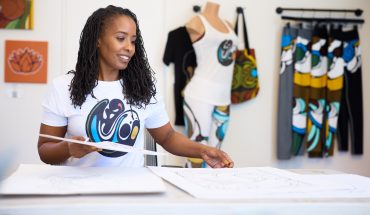by Todd Cohen
We are too quick, in this American life, to throw away the things, and the people, we no longer think we need. Fortunately, Nancy Welsh is here to pick up the pieces.
“I’m a sucker for the Cinderella story,” says Welsh, 46, the founder of Builders of Hope, a Raleigh nonprofit that saves homes from demolition and recycles them, often moving them to distressed neighborhoods to create rehabbed communities. The actual work of rebuilding is done by homeless people and former prisoners the nonprofit trains for the construction trade.
“It’s what I do with houses,” Welsh says. “I take something someone else has thrown away, and we turn it into something absolutely beautiful. It’s the same way with the guys we work with out of prison and homeless shelters. It’s taking a life the community has disregarded and giving them a chance to be part of our team, and it’s transformed them into a wholly new individual and person because they’re loved and they have a purpose. And that’s all anybody ever wants.”
After a 10-year career in sales and marketing, including a final post in Chicago as supervisor at advertising agency Leo Burnett, Welsh took time off to raise four children, including a daughter adopted from Kazakhstan.
In 2006, Welsh launched Builders of Hope with money her late father left her. Today, operating with nearly 50 employees and an annual budget of $5 million, the nonprofit has created recycled neighborhoods and projects in Raleigh, Fuquay-Varina and Durham, and operates offices in Charlotte, Dallas, Atlanta and Tampa.
In 2010, Welsh, who serves as CEO and chair, received the Innovation in Philanthropy award from the Triangle chapter of the Association of Fundraising Professionals. And in January, the nonprofit received the first patent in the United States for a process to build green communities that consist entirely of rescued, recycled homes.
What led you to create Builders of Hope?
My dad, Dennie Welsh, was with IBM. He created the division that is now IBM Global Services. My dad was a devout Christian and man of faith. He gave away a lot of money to build churches and for college scholarships. He passed away in 2004. In honor of my father, I decided I would do something about the poor.
I also ran into people who worked and weren’t homeless. They had shelter, but it wasn’t great, and they lived outside the city limits. They were teachers and police officers, the backbone of our city, and they were priced out of being able to live here. I also have a soft spot for the homeless and ex-offenders. In a lot of cases, they’ve paid their price and are let out – and are not forgiven. They can’t get jobs or housing.
Who are your heroes?
My homeowners. They’re pioneers. We go into the worst neighborhoods, and we turn these neighborhoods around. Those first homeowners that go in, a lot of times they’re facing gang violence. They’re really at the bull’s eye of crime for this city when they go in.
What are the biggest challenges to developing more affordable housing?
The government and our country have really caused and embraced a grave social injustice, the feeling that poor people don’t deserve the best and highest quality because they’re not going to take care of it. So they go into these neighborhoods, they tear down all the houses, and scatter all the people. And then they rebuild something new and beautiful, pricing most of them out of the market.
What can be done?
Funding. Government funding is all being cut. And the government is challenging the private sector to step up to fill the gap. We’re working with N.C. State University to develop some research that demonstrates to big companies the social return on investment that comes back to them when they invest in these types of neighborhood redevelopment projects. We’re working on raising the funding for the research.
You earned a degree in communications at the University of Tennessee in Knoxville. What did you do after college?
I really wanted to work for an ad agency, but most of the big jobs were in New York City, and my father did not want me living there on my own. When I was at the University of Tennessee, they switched all the Coke machines to Pepsi. I led a crusade on campus to get it switched back to Coke. My first job was with Coca Cola USA. I was based in the Baltimore office as territory sales manager.
What did you do next?
My senior project in college was introducing a new Kellogg’s product. In Chicago, I landed a job with Leo Burnett, the branding and advertising agency, and was placed on the Kellogg’s account, which was my dream job.
In his book, Who Says Elephants Can’t Dance?, former IBM chairman and CEO Lou Gerstner attributed the turnaround of IBM to your father. And your mother, Jacqueline Welsh, taught elementary school and then was a stay-at-home mom. What lessons did you learn from them?
Be a person of character and integrity, and putting God first.
Your father and ex-husband were IBMers, which, as you quip, stands for “I’ve been moved.” You were born in Huntsville, Ala., and lived in eight cities before moving to Raleigh in 1996. Does a nomadic corporate life change your attachment to people, places and things?
No. It’s important to be genuine and open and welcoming to new and enduring friendships in every place I live, no matter how long I stay there.
IBM brought us here for my husband’s job, and I telecommuted for a while for my job in Chicago. What’s kept me here are relationships, Builders of Hope, and the fact that it’s a great city and a desirable place to live. This is where I founded Builders of Hope. There was always somebody willing to help. Raleigh is a great place to be able to innovate. The people here are smart, they’re really talented, and they’re very eager to get involved and to be part of a solution.




